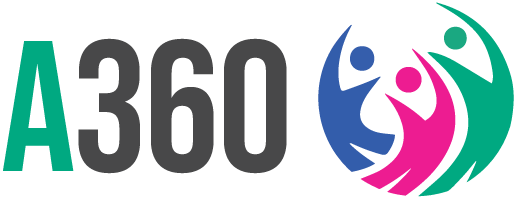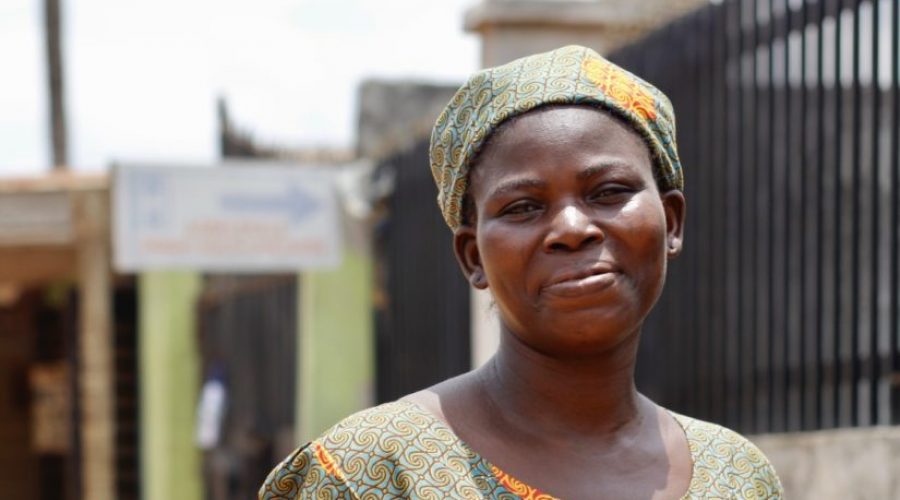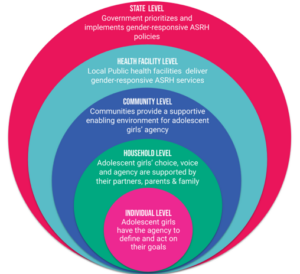By Emma Beck, Associate Communications Manager, PSI
When 9ja Girls first came to the Agbelekale Health Clinic, Mrs. Bolanle Falohun was skeptical.
It was a girls-only sexual and reproductive health (SRH) program hosted by the community’s Primary Health Care Facility.
Sure, the clinic’s 9ja Girls room looked inviting – pink sequins dazzling the wall, gold glitter sparkling from princess-cut mirrors.
And it was a first. Mrs. Falohun had never seen the clinic dedicate a space or deliberately allocate services to the community’s youngest girls.
Still, Mrs. Falohun worried about what her neighbors would think if word got out that her 19-year-old daughter Taiwo had taken part in a program in which girls had the option to take up contraception. Word on the street was that contraception could hurt girls’ chances of having a baby once they married. Worse still, she worried that attending 9ja Girls would suggest that her daughter was… well, having sex. Mrs. Falohun didn’t want Taiwo to have anything to do with it.
That was, until Taiwo got pregnant.
Twice.

Across Nigeria, girls like Taiwo navigate a complex web of socio-cultural barriers that limit their access to SRH information and services. Myths and misperceptions around contraception are rampant, and public health facilities often lack adolescent and youth SRH services.
The repercussions run deep.
According to the Demographic Health Survey, 23 percent of girls in southern Nigeria will give birth by the age of 19. Some three in 10 girls aged 15-19 want but, for a myriad of reasons, don’t have access to modern contraception. And across the nation, one in four pregnancies among this age group will end in an abortion, many of which are unsafe.
The need to pave pathways for young girls to own their health and life decisions remains imperative.In 20 months:
- 69,254+ girls aged 15- to 19-have voluntarily taken up a modern contraceptive method
- 7 in 10 girls who engage with 9ja Girls take up a method
- 7 in 10 choose a long-acting method
The insights that have driven our impact? We’ve got you covered. Just click below.
*Data from Jan. 2018-Sept. 2019.
A Girl-Powered Solution
Adolescents 360 (A360)’s 9ja Girls – an adolescent and youth SRH program powered by PSI and implemented by the Society for Family Health— helps fill this critical gap in programming for young people within the public health system.
The project, which works alongside young people and in partnership with public health facilities, breaks down the misperceptions surrounding contraception and delivers girl-defined spaces for unmarried girls aged 15-19 to make their health and life choices, on their own terms. Through Life, Love and Health (LLH) classes that integrate youth-friendly contraceptive counseling, 9ja Girls creates pathways for girls to identify their dreams and understand the role contraception can play in achieving them. A trained, youth-friendly provider embedded in the 9ja Girls program delivers counseling that leads with what girls have expressed as priority concerns: namely, the reassurance that all methods are safe, reversible and a girls’ own choice to use, when and if she wants.
This is change that drives impact. From January 2018 through September 2019, 9ja Girls has worked in nine Nigerian states to serve more than 69,254 15- to 19-year-old girls with modern contraception. Roughly seven in 10 girls who engage with 9ja Girls voluntarily adopts a method, and about seven in 10 choose a long-acting method.
As Mrs. Falohun explains, 9ja Girls has helped Taiwo identify what she can do to protect herself from an unplanned pregnancy, and what steps she needs to take to stay on track to raise her baby, to eventually wean off from nursing and then get back to school so she can pursue her dream of starting a hairdressing business.
“This is a good place for girls,” Mrs. Falohun adjusts her head wrap, flashing a fusion of greens and turquoise. “9ja Girls has given Taiwo more confidence and kept her more focused. I want every girl to at least use a condom and to grow to be successful. 9ja Girls responds to girls’ expressed desire for trusted sources, and safe spaces to turn to for questions about body changes and life choices.
9ja Girls allows girls to seamlessly gain entrepreneurial skills to support their desire for financial independence; ask questions about their bodies and lives; and access sexual and reproductive health services in service of girls’ self- expressed need to navigate changing, complex times.
But it took some trial and error to finally land an intervention that works.
Get insights into the steps we took to think strategically and intentionally to develop the best prototypes for our work in Nigeria




